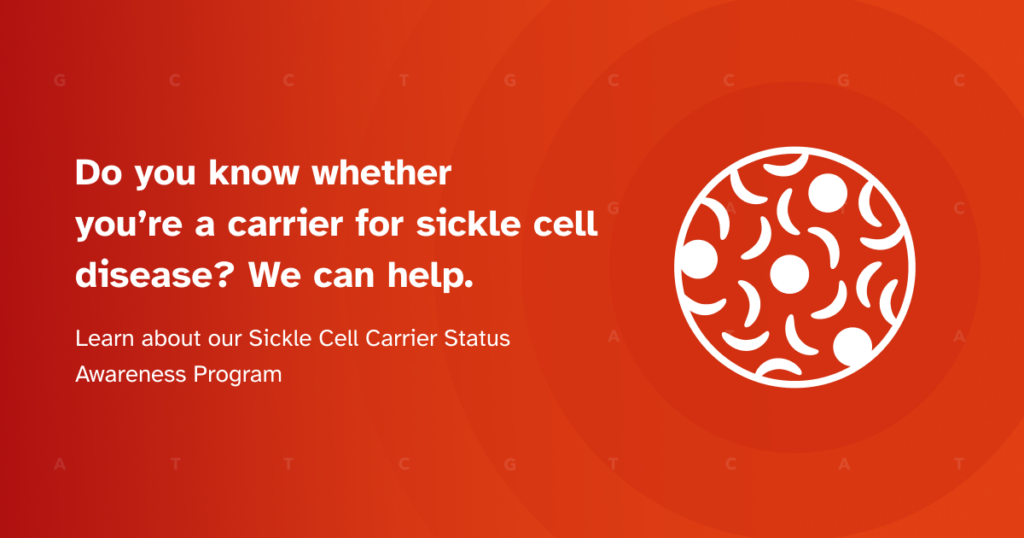For World Sickle Cell Day, we want to spotlight the work our researchers and collaborators are doing as part of 23andMe’s Sickle Cell Carrier Status Awareness Program.
This day is meant to draw attention to those affected by sickle cell disease worldwide and what it means to have sickle cell trait. Raising awareness can help empower people to learn their own sickle cell status and draw attention to the need for further research and treatments for sickle cell disease.

What are Sickle Cell Trait and Sickle Cell Disease?
An estimated 300 million people worldwide and 1 in 13 Black or African Americans have sickle cell trait, meaning they carry one copy of the HbS variant in the HBB gene.
The HBB gene contains instructions for making part of the hemoglobin protein, which helps red blood cells carry oxygen in our bodies. The HbS genetic variant can cause red blood cells to have a “sickle” (or crescent) shape.
People with sickle cell trait typically do not experience any symptoms unless under extreme conditions, because they usually have enough normal hemoglobin in their red blood cells to compensate. However, if both parents have sickle cell trait their children are at risk of inheriting the form of sickle cell disease known as sickle cell anemia. In people with sickle cell anemia, red blood cells can get stuck in small blood vessels, which can lead to pain crises, organ damage, and other serious complications.
That’s why understanding whether you have sickle cell trait is so important. Over 100,000 people in the United States are affected by sickle cell disease, disproportionately impacting the Black community.
The Sickle Cell Carrier Status Awareness Program
At 23andMe, we believe that knowledge is power. understanding risks offers people opportunities to mitigate them.
But more than that, 23andMe also offers a unique research model that allows individuals to learn about their genetic likelihood of developing a condition and participate in innovative genetic research that could find new treatments.
As part of our Sickle Cell Carrier Status Awareness Program, 23andMe has collaborated with academics and advocacy organizations to increase understanding of sickle cell. In addition we’re providing resources for those with sickle cell trait and sickle cell disease. With the help of the Sickle Cell Foundation of Georgia, Breaking the SSickle Cell Cycle, and the Morehouse School of Medicine, we’re working with Black communities to promote awareness.
As part of that effort, 23andMe offered its Health + Ancestry Service at no cost to Morehouse School of Medicine students, faculty, and staff. The service includes a Carrier Status report on sickle cell anemia.* The Sickle Cell Foundation of Georgia also offered program participants counseling after receiving their 23andMe results. This program is one of many ways 23andMe and the Morehouse School of Medicine work together to increase equity in genetics and genomics.
“I see this as an opportunity to remove a barrier to screening,” said Dr. Lametra Scott, Executive Director of the Breaking the SSickle Cell Cycle. “Typically, young adults don’t get tested. It’s best to have the information before family planning so you aren’t blindsided and have options.”
The Power of Research
23andMe also offers a unique research model that allows individuals to participate in innovative genetic research that could lead to new discoveries and potentially help find new treatments.
So along with empowering people with knowledge of their sickle cell trait status, 23andMe also contributes to sickle cell research.
Most recently, a study in collaboration with researchers from the National Institutes of Health and Johns Hopkins University School of Medicine looked at the link between blood clots and sickle cell trait. The study is believed to be the largest and most diverse genetic study of sickle cell trait ever done. The scientists presented preliminary data from their work in late 2022. When we publish the complete study, we look forward to sharing those results with the community.
Learn More
Find out about 23andMe’s Sickle Cell Carrier Status Program here.
*The 23andMe PGS test uses qualitative genotyping to detect select clinically relevant variants in the genomic DNA of adults for the purpose of reporting carrier status and reporting and interpreting genetic health risks. The relevance of each report may vary based on ethnicity. Our carrier status reports can be used to determine carrier status, but cannot determine if you have two copies of any genetic variant. These carrier reports are not intended to tell you anything about your risk for developing a disease in the future or anything about the health of your fetus, or your newborn child’s risk of developing a particular disease later in life. For certain conditions, we provide a single report that includes information on both carrier status and genetic health risk. The Sickle Cell Anemia carrier status report is indicated for the detection of the HbS variant in the HBB gene. The report can tell you if you have two copies of the tested variant, and if you are at risk of developing symptoms of sickle cell anemia, but does not describe your overall risk of developing symptoms. This test is most relevant for people of African descent. It is also relevant for people of Middle Eastern and South Asian descent, as well as people from the Caribbean, the Mediterranean, and parts of Central and South America. For important information and limitations regarding each carrier status report, visit https://www.23andme.com/test-info/